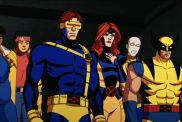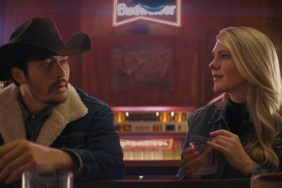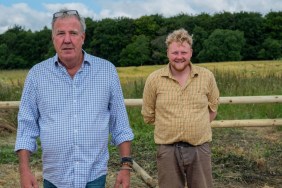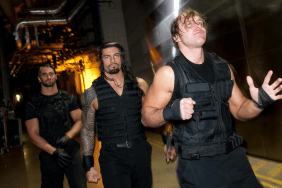At the age of 34, German filmmaker Fatih Akin had two breathtaking films under his belt, Head On and The Edge of Heaven, both which turned many heads when they premiered at various film festivals. Both movies were rather heavy dramas involving characters of Turkish descent living in Germany and how they were able to define their homes and their roles, but Akin’s new movie Soul Kitchen couldn’t be any more different than his previous outings, being more of a light-hearted comedy based around the young owner of a restaurant plagued by problems.
Zinos, played by Akin’s friend Adam Bousdoukos who owned a similar restaurant and whom in fact inspired the writing of the movie, is trying to keep his restaurant “Soul Kitchen” solvent, but no matter what he does, he just can’t seem to get customers in. When his convict brother Illias (Moritz Bleibtreu) gets out of prison, he comes to Zinos for a job and things start to get more complicated as a number of factions want to close the family-owned restaurant or turn it into something it’s not. Akin also reunites in the movie with Birol Ünel, who starred in Head On, this time playing an eccentric chef Zinos hires to try to make his restaurant more upscale.
Akin is a director we’ve wanted to talk to for a long time, mainly because we were so intrigued by those unique earlier films of his. Soul Kitchen is very different being a far more commercial and mainstream film, but audiences looking for an easy way into the world of Akin’s Hamburg should be able to enjoy its mix of food, music, romance, humor and a far more light-hearted method of storytelling than we’ve seen from Akin in the past. You can read our interview with Akin below this exclusive clip from the film:
ComingSoon.net: I read that “Soul Kitchen” was something you wrote a long time ago, but instead of making that after “Head On,” you directed “The Edge of Heaven.” Why did you decide to go back to this? I think people who’ve seen those movies will think this is such a departure, like “Where did this come from?” And this is probably more of a personal movie than either of those two films, right?
Fatih Akin: Yeah, in a different way, it is a very personal film. I felt like I do it now or do it never. If I’m not going to do the film now, I will never do it. I don’t want to (turn) 50 and remember the good old days and do a very nostalgic film. The film is nostalgic anyway already, it’s not that far away since I tried to say farewell to that lifestyle which is in the film. But for me, it was very important to close this lifestyle, which was very important in my life and very long, to close it with that film. It was a way to work with skills, and it was an experimental film also. On the one hand, it was very personal and very intimate work. On the other hand, it was “Okay, this is a comedy and a genre” and the films I do in the future will need a lot of experience. I should try something different then “Head On” and “Edge of Heaven.” Move the camera more and work with light and different styles, experiment with the skills I have.
CS: The movie has a very poppy look compared to your other movies, very clean and different from your last two movies.
Akin: Yeah, it has different lighting. “Head On” has no backlight at all, because we had no time for that. Since now I was a bankable director, I could afford backlight and I said to the DP, “Come on, we’ve worked since ‘Solino’ together, almost ten years.” Somehow, Rainer (Klausmann, his Director of Photography) and me, we’re like a couple, like a marriage, and I was really wondering if I was going to do the film with him or not. I doubted it in a way, because in the end of the “Edge of Heaven,” I was not very satisfied with some of the things. A friend of mine died during shooting, he was the producer of the film, and I struggled with myself to do it with Rainer, because Rainer and me, when we come together, we become very lazy. We have a problem and instead of finding a new way to solve it, we do it the way we know. You want to challenge yourself and you want to discover more things about yourself. When you’re young and at an early stage, you don’t want to have a style. I don’t want to have a style, I’m not interested in that. But I’m so glad that I did it. It was the best thing that could happen to the film. He saved the film. He was the only authority there, so here I am, the director and producer, I’m not satisfied what I’m shooting and I reshoot it, reshoot it, and buy new days, new days, new days, because I’m the producer. “I need three more days, how much does that cost? Give me more!” and he was the guy who kept it together. He was the oldest guy on the set, and he was the only authority left for me.
CS: The thing about the movie is that there are all these scenes of people partying and having fun and I wondered if it ever got out of control because everyone was having so much fun, that you forget you’re making a movie and have to stop and say “We need to the next scene.”
Akin: We celebrate a lot during the film… (chuckles) but not during the shooting, because those days were tough stuff. So many extras, and it started with 20 or 30 extras, but the room was so big. I fell in love with the location. It was very important not to do that in a studio, but I wanted to move the camera from the inside of the room to the outside, and I wanted to have a window where we see outside, it was very important, so no studio. We were on the quest to find the right location, and somehow, I wanted to have a location where you can discover it from the outside, a building that has a character, and finally we found that location, it looked like an old ship. Everybody said, “It’s too big, it’s too big” so what we did is we wrote the character of the Socrates, the old man with the boat. He was not part of the script. It was a customer who came there and left, but because the location was so big and we needed to separate the location to make it smaller, so we invented the old man with the boat who stays there for rent. You see? It still was too big and we filled it out with people. We had 20 people and it still looked empty, 50 people there, still empty. When you have the shots from above and you see how much it grows? More people, more people, more people, it’s difficult to handle.
CS: It looks great though.
Akin: Thank you very much.

CS: That’s one of the throughlines with “Head On,” because you had some clubbing and partying in that, although that was far more stark and lonely, just one guy by himself, which is very different from “Soul Kitchen.” I was curious why you didn’t make “Soul Kitchen” as your first movie?
Akin: It was written the editing of “Head On.” I had to become a producer for “Head On” to control the film. I had to put part of my fee into the budget to become a producer so I was very broke after shooting, and I desperately needed a project. I had the naïve idea to write “Soul Kitchen” just set in my neighborhood with Adam in his real restaurant.
CS: Wait, so Adam is actually the guy the movie is based on as well as actually being the star of “Soul Kitchen”?
Akin: Yes, it’s his story. You see? It’s very biographical. And I had the idea, “We have to shoot this on video, very fast, 1, 2, 3.” We go out and shoot the film. It was like an “S.O.S” project to save us in a way. Then the script went into a second draft and it was pre-financed in a way, and suddenly, “Head On” won the Golden Bear at the Berlin Film Festival and overnight, I became this international filmmaker. The reviews everywhere around the world were like, “Oh my God!” They scared me in a way and made me nervous. I was so nervous that I didn’t trust “Soul Kitchen” anymore as the film after “Head On.” I had the problem that I felt myself under pressure that I had to confirm the success of “Head On.”
CS: You had to make another serious movie.
Akin: Yeah, and so “The Edge of Heaven” was done and when I see the film today, I really see the pressure in which the film was made. And then in the last week of the shooting of that movie, my producing partner died, who I found the company with him, Andreas. He always wanted me to do “Soul Kitchen.” “Let’s make this comedy, we can make some money with that and we can have some fun. Let’s do something for audiences,” and I was like, “No, no, I don’t trust the screenplay. The (cinema snobs) they will f*ck us. No, no, no, let’s don’t do it.” And he said, “I don’t give a sh*t what the (cinema snobs) say, you have to do your own thing! Don’t care, don’t be the slave of your success.” And it took me awhile to learn that lesson he gave to me.
CS: I would think that making “Edge of Heaven” would have created even more pressure to do something like those movies, so what’s the reaction been to “Soul Kitchen” from those people who liked those first two movies and see this movie and are shocked that you’re having fun and doing comedy?
Akin: I was very scared, I was very nervous. That’s why I always was rewriting the script. Every night, I’d rewrite the script. That made it also difficult. I was not on time shooting this for the first time, because I was changing everything. We’d done all our pre-work. By that, I mean that I knew all the camera shots before we shoot, months before. I do the camerawork after we rehearse with the actors so I know what the actors are doing to do, so that’s why I can choreograph the camera with my DP. Rainer showed us all the way. I would come to the set and say, “Let’s do everything different.” Instead of doing this, I rewrote the scene and “we’ll do it like that.” So all the trucks who were standing there, have to go there. One hour of delay, two hours of delay, three hours of delay. Every day was like that. I saw the rushes in the evening. “Okay, the rushes go in that direction, I have to make the script go to that direction.” Writing the script at night, very desperately, very lonely in a way.
CS: The movie feels like it’s almost been made for a different audience, for more of a mainstream audience, than your previous movies. For audiences who may need easier material rather than the tough subject matters of those other movies, for audiences who want to go to the movies to have fun.
Akin: I was wondering how mainstream I can be without selling myself, in a way. I think this is funny. I believe in what we are doing. I was like, “Hey, this is not the arty stuff, it’s not the arty way of writing.” It is maybe a different audience. In the end, the film in Germany was a huge success, but it was a success because it worked in the multiplexes but where the film really worked was in the arthouse cinemas. The arthouse theaters, they were so thankful for that, because more and more and more cinemas close.

CS: It’s the same here.
Akin: It’s the same everywhere. In France and Germany, they close and close and close. What happened was that there’s too many films and the multiplexes play them, but the multiplexes are really tough. You have to make in the first weekend, it has to go good, and you don’t really give the film time that people can discover it. These days are over, which is sad. There’s huge competition in the way, and last year, in the arthouse theaters, three films worked. Haneke’s film “The White Ribbon,” my film, and “A Serious Man.” These were the three films that really worked in the arthouse.
CS: One of the other things this has in common with “Head On” is that you have Birol starring in the movie. Was it hard for him to make the transition to straight comedy from that? In fact, much of your cast doesn’t normally do comedy. How was it for him especially?
Akin: You cannot expect Birol acting. Some directors try it and it’s garbage. There are other popular examples who show that sometimes it doesn’t work. Chaplin, the great master, his last work with Brando, who is an icon, and they did “A Countess From Hong Kong” and it doesn’t work I think but not really much. There’s no chemistry. You see the pressure on Brando, you see the pressure on Chaplin in a way. In real life, you can have a lot of funny and crazy situations with Birol, because he’s crazy. The thing with the gazpacho is something that he could do. Sometimes, you can sit with Birol in a cab and he can get out of the cab while the cab is driving 30 miles per hour. He’s doing stuff like that, and this has a strange humor in a way. (laughs) You have to use that, and the way we tried to use Birol was to use his insanity was the way we handled that in the film. His part was bigger, it was a bigger part in the script, and it was too difficult.
CS: Did you shoot a lot of that stuff that didn’t make it into the film?
Akin: No, no, no… “Listen Birol, I don’t go with you to the airport and shoot a farewell scene. Forget it. We forget the airport, man.”
CS: There’s a phenomenon of sorts in America which is often called “food porn.” They have all these cable channels and TV cooking shows and “Soul Kitchen” really taps into something that’s really popular even though you wrote it seven years ago. I don’t know if you have that in Germany…
Akin: Oh, yeah. Every time you switch on the telly, somebody’s cooking… anything, and nobody cooks that stuff. They just watch it. They don’t follow-up and cook it. I was also a bit inspired by the stories of Anthony Bourdain, the French New York guy. Some of the stories would be crazy and Birol is so like that, too. So we were like, “Can we jump on this train with his cooking?
CS: That’s who Birol’s character reminded me of him a little, kind of a punk chef who takes no bull.
Akin: Yeah, we were inspired a bit by him. And Birol had to learn cooking for that. He can cook. He invites you for dinner and he had cooked something, and it tastes good, but the way he cooks… (laughs) the kitchen when Birol has cooked something looks like Berlin ’45. He cuts his fingers, everywhere is blood, stuff like that, so he had to learn cooking. “I can cook, I can cook, I don’t have to learn cooking.”
CS: He had to learn to cook so you could actually film it and make it look professional.
Akin: Sometimes we needed a stuntman for some scenes with the knives especially, but it worked. You believe this character. During shooting, no one didn’t believe he was a chef. He made the best performance of all the actors. Everybody is good but his performance in the film is the best.
CS: I want to talk about the music, because you have an interesting relationship with music in your films, for instance in “Head One,” you mix traditional Turkish music with post-modern German industrial music. This one really goes back to ’70s movies. Can you talk about your relationship with music and why you have such a varied taste? And did you have any problems getting the rights to any of those well-known songs?
Akin: We cleared the rights before we used it. This is something I learned through “Head On.” Before I learned, I did three films and it was always such a bad experience that you fall in love with a song in the editing room and it works perfect, and then you cannot get the rights, because it’s too expensive or the musicians don’t want you to use the track. I went through several traumas with that, falling in love with a track and then you don’t get it. It’s like falling in love with a girl and they don’t….

CS: I think every director has to go through that at one point in their career.
Akin: So in “Head On” for the first time, we changed the style. We cleared the music before. “These are the songs I want to use in the film. Can we ask how much do they cost?” And then they were like, “Okay, you can get all the songs from ‘Head On’ for 150 or 180 thousand Euros.” I’m not sure about the number. On the calculation, we had just $20 thousand. I wasn’t the producer so becoming the producer, I said “No, no, no, we’re going to spend 150 thousand and instead of that, I won’t use any lights or any dollies or any Steadicam, nothing.” The money we saved (on the look), we used on the music. After that, I was a bit more bankable, so in “Soul Kitchen,” we could use more songs and more visual skills.
CS: When you first made “Head On,” was it always planned as a trilogy and is that the next thing you’re going to get back to?
Akin: Yes, yes. I was interrupting the trilogy because after “The Edge of Heaven,” I was exhausted. I was emotionally exhausted. Andreas dies in the last week of the shooting, and he was a very close friend of mine.
CS: Of course, ’cause you did make two movies together.
Akin: Three actually. The documentary, but he also worked on “Solino.” He was my artist consultant. We shared our lives and partying with groupies in Spain in some motel rooms. We were friends and after he died, it was strange because certain moments which were in the film like the mother comes to pick up the dead body of the daughter, and she wants to know how she died and stuff. Some of these scenes happened in real life, they repeated themselves. It was a bit scary. Andreas died in the room where Hanna Schygulla had her breakdown with the cameras involved. Certain images, too. I was in the airport and I saw how the coffin of Andreas went into the plane after I shot the same thing. You see? They repeated themselves. It was tough, but instead of doing nothing, I decided to overcome the grief of the death of my friend by doing “Soul Kitchen” because he always wanted me to do that. It’s another reason to make the film very personal, that fact and the fact that this is a farewell to a certain lifestyle.
CS: There isn’t a lot of connection between the other two moviesthough they both deal with the Turkish experience in Germany and Germans going to Turkey.
Akin: It’s about travel and about home.
CS: Both those movies, right, so is “The Devil” going to follow that tradition? What’s the throughline going to be with “The Devil”?
Akin: The general idea between devil, death and love, and love is the opposite for the Devil. For me personally, it’s an equality to understand the human being. These were the three soils of the human being for me. It’s like “love,” whatever that is – the love that keeps everything together, the love to God, the love between man and woman, between a father and a son, between children. Forgiveness is also about love. This is one part of the human being, of the existence of the world. Without love it would get destroyed, but on the other hand, you have the Devil, which is the opposite.
CS: Is this going to be a very literal movie where it will actually involve the devil or is that just used as a metaphor? Is this going to be a movie of bad things happening to people?
Akin: There is a simulated travel into the hell in the film. If you’re looking for the hell, you don’t have to go to the afterworld I guess. The hell is here. The Holocaust was hell, Cambodia is the hell, the Third World. You don’t have to go somewhere else. You can find it here. The death was always meant as a transformation. It sounds a bit theoretical, but the transformation between the love and the Devil. Death is like a tunnel. When you dream about the death in Eastern philosophy, death always means a metamorphosis, not in a literate sense.

CS: I hope when “The Devil” comes out, you won’t have to include “From the director of ‘Soul Kitchen'” in the trailer, because you may need to find a smoother way to get fans of “Soul Kitchen” into “The Devil” and to whatever the next thing is. Maybe you have to do another comedy after that just for the “Soul Kitchen” fans.
Akin: “Soul Kitchen” gave me a lot of new audience. My audience in Germany is usually something like half a million people. “Soul Kitchen” for the first time was like $1.3 million, huge. The most successful stuff I had so far before “Soul Kitchen” was “Head On” and that was like 800 thousand people watched the film, because Germany is the main kitchen. “The Devil” will be a philosophical film. It won’t be an easy film. It will be tough in a way. I don’t think it will be very difficult, like very arty. I try to make it simple in a way, but I hope that through the success of “Soul Kitchen” that people who like that will go into the film and see it. Why not? Let people see the film. People must see the film. That’s what we’re doing.
CS: Have you been approached by Hollywood and have you looked at any scripts from Hollywood to do after “Soul Kitchen”?
Akin: Yeah… even before.
CS: Does that interest you at all or do you not feel you’ll have the control that you have producing your own movies?
Akin: Not yet. It can happen, but not yet. It has to fit. I’m not this kind of studio guy like Florian Henckel von Donnersmarck or (Wolfgang) Peterson. I can’t do that.
CS: We’ll see if Florian is a studio guy because he’s only making his first studio movie (The Tourist) right now.
Akin: You get hired by the studio. “This is the budget, these are the actors and this is the script, go out and shoot it.” I don’t dis that. I don’t mean to negatize this. I respect that, but I think that if I don’t have to do it to survive, I won’t do it. The film wouldn’t be good. These films have a certain expectation for an audience, and maybe I could not fill that expectation. I never shot an advertisement, not because of the philosophical or idealistic reason. I don’t think I can sell something. I can tell a story. I hope I can still tell a story.
CS: Well, you still have time because you’re quite young. But I was just thinking as you said that there are some great European filmmakers like Paul Verhoeven and Wolfgang Peterson who made amazing artfilms in Holland and Germany and then they went to Hollywood and they just didn’t make movies that were as good.
Akin: I would like to get into the challenge to do a film just as a director. I’m interested in that, because I’m an auteur. I’m writing and directing and producing the sh*t I’m doing but I’m interested in just being a director.
CS: It would be interesting because if you do one movie like that, then people will go back and watch “Head On” and some of those other movies just to see where you’re coming from.
Akin: But I come here and write something. That could be another option, because I think there’s an interesting world here in America and in New York. All these cab drivers from Bangladesh, from very poor places. They drive these rich people in Soho and to Tribeca. There’s a huge gap between where these people come from. This is interesting. I don’t know. It interests me. Gangs from Cambodia in Los Angeles, I would like to write something about them, but for that, I would have to live here. I love cinema but I also have a social life, wife, kindergarten, parents, all that stuff, and I kind of have to live, too.
Soul Kitchen opens on Friday at the IFC Center and the Lincoln Plaza Cinemas in New York.









